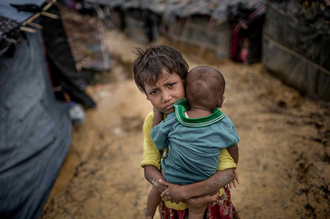CAFOD welcomes ICJ decision on Rohingya Muslims in Myanmar

Rohingya children - image CAFOD
Source: CAFOD/ICN
The UN's highest court has ordered Myanmar to do everything in its power to prevent the further genocide of Rohingya Muslims.
In a unanimous ruling today, 23 January, the International Court of Justice rejected arguments made by Aung San Suu Kyi in The Hague in December and set out urgent steps for the predominantly Buddhist nation to end the violence.
The mainly Muslim west African state of The Gambia had asked the court to impose the emergency measures - pending a full case that could take years. At least 24,000 Rohingya were killed during the bloody military crackdown by Myanmar in 2017. More than 740,000 Rohingya men, women and children fled into neighbouring Bangladesh, where they are living now in very overcrowded refugee camps.
Janet Symes, CAFOD's Head of Asia and Middle East Region, said: "The decision of the International Court of Justice (ICJ) sends a clear message to Myanmar and the rest of the world. While the threat of violence and further killings still exists, Rohingya refugees who have fled to Bangladesh cannot be forced to return to Myanmar.
"Over 700,000 women, men and children do not have the necessary guarantees of their safety, their rights and of their means to earn a living to be able to return to their homes, despite their longing to do so.
"When I visited the refugee camps in Cox's Bazar almost everybody I spoke to was desperate to go home. But they didn't feel it would be safe for them to return and the decision of the ICJ has confirmed this.
"As a humanitarian organisation, we are interested in there being an ability to achieve peace: that requires a process of justice and of reconciliation. Our hope is that the Myanmar Government heeds the ruling of the ICJ and takes urgent steps to prevent violence against the Rohingya people."
.

















